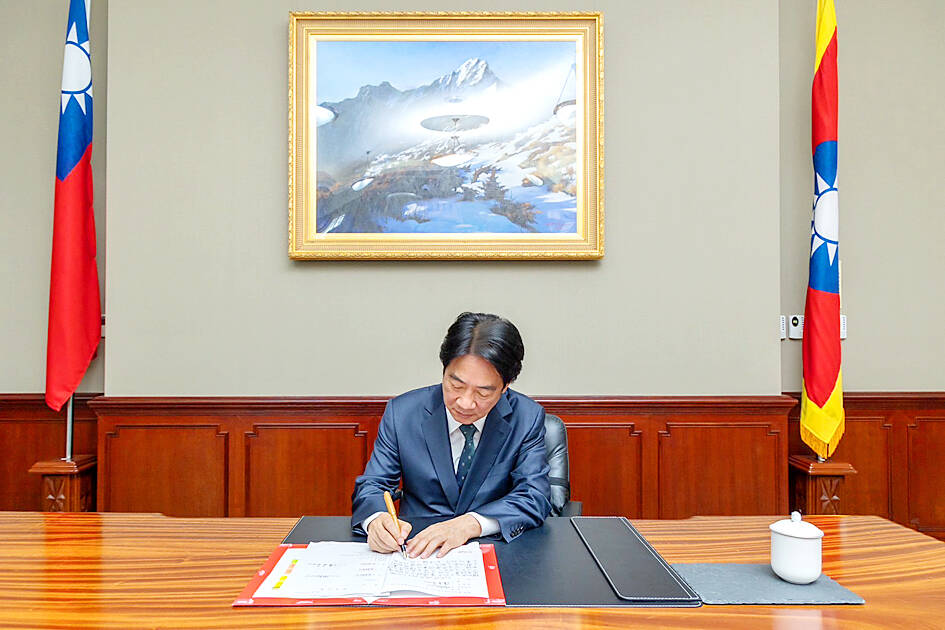President William Lai (賴清德) yesterday said he had signed into law controversial amendments that would expand the legislature’s power, but that he would soon seek a ruling on their constitutionality.
Lai said he supports legislative reform, but not the unconstitutional expansion of legislative power.
“Legislative reform must comply with the law and the Constitution,” he said.

Photo courtesy of the Presidential Office
The Legislative Yuan’s investigative powers must not infringe upon judicial power and the power of the Control Yuan, “let alone infringe upon people’s basic rights such as privacy, business secrets and freedom from compelled speech,” he said.
Lai said he would therefore seek a ruling from the Constitutional Court to safeguard constitutional order and uphold people’s basic rights.
He added that he would also apply for “a preliminary injunction” by the court to stop the amended laws from being implemented before it issues a ruling on their constitutionality.
Regarding the amendments “obligating” the president to deliver an annual state of the nation address to the legislature and engage in an impromptu question-and-answer session, Lai said it was an “attempt to change the constitutional design of responsible government.”
The constitutional order deems that the president is not accountable to the Legislative Yuan and is therefore not required to deliver an address to the legislature. However, the president can choose to do so voluntarily.
The amendments also conflate the Executive Yuan — which is accountable to the Legislative Yuan — delivering policy reports with the president’s address to the legislature, he said.
The Constitution and the law governing legislative power already have a mechanism for the Legislative Yuan to “listen to” the president’s state address.
“I have said before I am willing to deliver it in the legislature under an arrangement in compliance with the Constitution,” Lai said.
He added that he would deliver the address to the legislature only after a Constitutional Court ruling on the issue.
Lai called on the opposition parties not to make “rash decisions” before the ruling.
In response to the opposition’s claims that Constitutional Court judges were appointed by the ruling Democratic Progressive Party’s administration and so are likely to rule in favor of the government, Lai said they were appointed by different administrations and have made a range of rulings.
“They have made the rulings to safeguard Taiwan’s democratic constitutional order and to move the country forward. I believe they will do so this time as well,” he said.
The Legislative Yuan on Friday voted down the Cabinet’s request for it to reconsider the amendments to the Act Governing the Legislative Yuan’s Power (立法院職權行使法) and the Criminal Code.
The Cabinet and the DPP have said they would separately seek rulings from the Constitutional Court.
The Control Yuan yesterday said it would also hold a press conference today to state its decision to seek a ruling from the Constitutional Court as well as file a “preliminary injunction” to safeguard its rights.
Additional reporting by Lin Tse-yuan

Taiwan is gearing up to celebrate the New Year at events across the country, headlined by the annual countdown and Taipei 101 fireworks display at midnight. Many of the events are to be livesteamed online. See below for lineups and links: Taipei Taipei’s New Year’s Party 2026 is to begin at 7pm and run until 1am, with the theme “Sailing to the Future.” South Korean girl group KARA is headlining the concert at Taipei City Hall Plaza, with additional performances by Amber An (安心亞), Nick Chou (周湯豪), hip-hop trio Nine One One (玖壹壹), Bii (畢書盡), girl group Genblue (幻藍小熊) and more. The festivities are to

Auckland rang in 2026 with a downtown fireworks display launched from New Zealand’s tallest structure, Sky Tower, making it the first major city to greet the new year at a celebration dampened by rain, while crowds in Taipei braved the elements to watch Taipei 101’s display. South Pacific countries are the first to bid farewell to 2025. Clocks struck midnight in Auckland, with a population of 1.7 million, 18 hours before the famous ball was to drop in New York’s Times Square. The five-minute display involved 3,500 fireworks launched from the 240m Sky Tower. Smaller community events were canceled across New Zealand’s

‘IRRESPONSIBLE’: Beijing’s constant disruption of the ‘status quo’ in the Taiwan Strait has damaged peace, stability and security in the Indo-Pacific region, MOFA said The Presidential Office yesterday condemned China’s launch of another military drill around Taiwan, saying such actions are a “unilateral provocation” that destabilizes regional peace and stability. China should immediately stop the irresponsible and provocative actions, Presidential Office spokeswoman Karen Kuo (郭雅慧) said, after the Chinese People’s Liberation Army (PLA) yesterday announced the start of a new round of joint exercises around Taiwan by the army, navy and air force, which it said were approaching “from different directions.” Code-named “Justice Mission 2025,” the exercises would be conducted in the Taiwan Strait and in areas north, southwest, southeast and east of Taiwan

UNDER WAY: The contract for advanced sensor systems would be fulfilled in Florida, and is expected to be completed by June 2031, the Pentagon said Lockheed Martin has been given a contract involving foreign military sales to Taiwan to meet what Washington calls “an urgent operational need” of Taiwan’s air force, the Pentagon said on Wednesday. The contract has a ceiling value of US$328.5 million, with US$157.3 million in foreign military sales funds obligated at the time of award, the Pentagon said in a statement. “This contract provides for the procurement and delivery of 55 Infrared Search and Track Legion Enhanced Sensor Pods, processors, pod containers and processor containers required to meet the urgent operational need of the Taiwan air force,” it said. The contract’s work would be